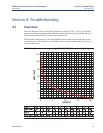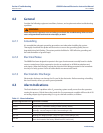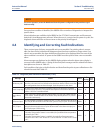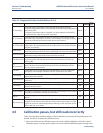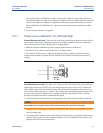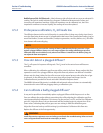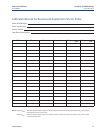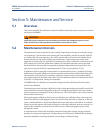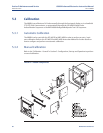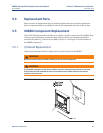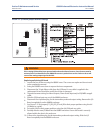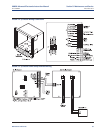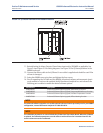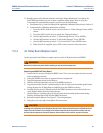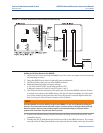
Maintenance and Service 79
6
888Xi Advanced Electronics Instruction Manual Section 5: Maintenance and Service
PN 51-6888Xi December 2012
5.1 Overview
This section identifies the calibration methods available and provides the procedures to maintain
and service the 6888Xi.
5.2 Maintenance Intervals
The maintenance interval required is quite variable, depending on the type of service the analyz-
er is placed into. The zirconium oxide sensing cell is non-depleting, and has no specific shelf life
or a defined life in flue gas operation. The cell of a probe that is mounted inside a boiler that is
burning natural gas may shift very little over several years. Acidic compounds are the main
aggressors to the sensing cell, typically SO2 resulting from sulfur contained in coal and heavy oil
fuels, and also HCl from the combustion of plastics in municipal incinerators and in industrial
thermal oxidizers. Sensing cells may experience significant degradation and signal shift in this
type of service, particularly if the operating levels of O2 are very low (below 1% O2).
A calibration check is generally recommended on a quarterly basis (every 3 months) by flowing
bottled gas to the probe. (Make sure that the operations personnel are notified when doing this,
and also make sure that the O2 control loop is placed in manual mode). If the probe readings
vary significantly from the bottle values, then a formal calibration should be conducted as noted
in Section 3: Configuration, Startup and Operation.
The 6888Xi offers a "calibration recommended" diagnostic that will indicate when the probe
needs to be calibrated.
Combustion processes that have a high level of ash or other particulate content will cause the dif-
fusion element on the end of the probe to plug off. A badly plugged diffuser will cause a slower
speed of response to changing O2 levels in the process. This can usually be seen on the recorded
trends in the control room.
When performing a calibration check or actual calibration, the calibration flow meter may read
lower if the diffuser is badly plugged. (Never increase the flow rate back up, however, as this can
cause a shifted calibration. Adjust the calibration flow rate only when a new diffuser is installed).
Always record the response time back to the process after the calibration gases are removed, as
noted on the calibration record at the end of this section. Diffuser pluggage can be tracked
through this record.
A visual inspection of the probe should be conducted during plant outages, paying particular
attention to condensed components. Condensation can be reduced or eliminated by insulating
the probe installation, including the probe mount, flange, and blue housing.
Section 5: Maintenance and Service
WARNING
Install all protective equipment covers and safety ground leads after equipment repair or service.
Failure to install covers and ground leads could result in serious injury or death.



